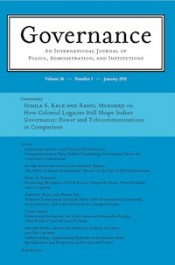Kumar discusses “What is governance?”
Last month, Governance published Francis Fukuyama’s commentary “What is governance?” Here, Professor Sudhir Kumar offers a reply to the commentary. (Read earlier responses further down on the blog).
 Francis Fukuyama suggests an alternative approach to measure governance which focuses on four aspects: procedural measures, capacity measures, output measures, and measures of bureaucratic autonomy. Fukuyama also argues that in order to better understand and measure governance, it needs to be separated from the concept of democracy. For him governance is about government’s ability to deliver. He also stresses upon the need to separate the ‘outcomes’ as an indicator of governance.
Francis Fukuyama suggests an alternative approach to measure governance which focuses on four aspects: procedural measures, capacity measures, output measures, and measures of bureaucratic autonomy. Fukuyama also argues that in order to better understand and measure governance, it needs to be separated from the concept of democracy. For him governance is about government’s ability to deliver. He also stresses upon the need to separate the ‘outcomes’ as an indicator of governance.
Fukuyama is right on three counts. First, we still need to debate ‘what governance is’ since there is very little consensus on the meaning of the term. Second, factually speaking, his argument is valid that we don’t have any proof to show that democracy and governance are correlated. And third, he is also right that the existing measures of state capacity have certain limitations. He also deals with problems of various attempts to explain and measure governance
However, his own ideas and arguments also suffer from the similar problems which he highlights in the case of the existing studies. For example, in his entire writing Fukuyama seems to be using concepts like effective government, governance, good governance, state capacity etc interchangeably. Fukuyama begins with simply defining governance but eventually switches over to the idea of ‘good governance.’
I would like to touch upon two issues in his approach. First, for Fukuyama the idea of governance begins with the notion of government. Here he loses the track of the concept of ‘governance’. Historically governance comes prior to the concept of government. Certainly the next question would be: if government came later, then who was performing the task of governance before? As we know, it was through various social and community organizations. However, with the emergence of monarchy and more organized forms of governance including government, the idea of participation or governance was sidelined and remained undercover till the World Bank report ‘took out the jeenie from the bottle.’
Let’s talk about the second issue, separating governance from democracy. I think governance and democracy go hand in hand. Separating both is like ‘taking the soul out of the body.’ Governance cannot be defined or conceptualized without democracy. Fukuyama explains his reason for doing this. He says that it will enable us to theorize the relationship between democracy as well as governance if we separate the two concepts.
Fukuyama could be right if democracy is defined in terms of procedural, minimalist sense (though he doesn’t mention it at all but it seems implicit). Certainly, logically this is correct to say that ‘effective’ rules can be made and enforced without having regular, free and fair elections, and to deliver services e.g. China. In fact, popular demands for rights are at times seen as hostile to the objective of providing services in time. India is a good example of this scenario.
A crucial question which Fukuyama misses is: who defines the objective, and who defines services? The answer is very categorical according to Fukuyama. It’s the government which defines them. Fukuyama goes one step ahead. According to him all these issues can be understood by applying Weberian notion of bureaucracy. So the entire debate on the government boils down to the bureaucracy on the Weberian standards. Fukuyama also seems to believe that government is ‘the’ determining institution in a state.
Ralph Miliband in his popular book The State in Capitalist Society published in 1969 used a phrase “Down with Marx and Up with Weber” to explain the increasing role of bureaucracy and decline of politics in the functioning of the advanced capitalist states. Miliband’s conclusion seems to hold true in Fukuyama’s approach to measure governance.
We have learnt from history that leaving it to the governments or to bureaucracy to decide what is right and wrong for the citizens may have disastrous consequences. The government needs effective checks from various economic, societal and international actors. The idea of governance is rather against too much expansion of the government. It helps in determining ‘how much government is right.’
Dr. Sudhir Kumar Suthar is an Assistant Professor at Department of Political Science, BB Ambedkar University, Lucknow, India and writes on issues of governance, comparative politics and public policy. He is co-author of Comparative Politics and Crisis of Governance: The Russian Conundrum.
